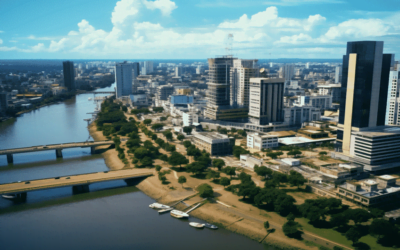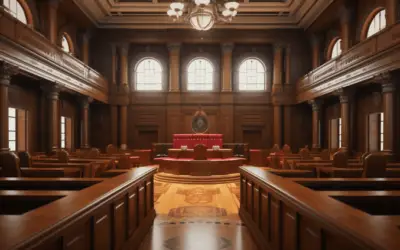Hey there, fellow drone enthusiast! Are you one of those curious souls who’ve typed “Lebanon Drone Laws” into that trusty search bar, hoping to unravel the intricate web of regulations governing unmanned aerial systems in the beautiful country of Lebanon? I feel your pain – delving into the nitty-gritty of drone laws can sometimes be as baffling as trying to solve a Rubik’s Cube in the dark.
But don’t fret, my friend, because I’ve got your back. I’ve combed through the depths of information and am here to shed some light on Lebanon’s drone laws and how they affect your aerial adventures.
Let’s face it, navigating the world of drone regulations can feel like venturing into uncharted territory. And I’ve been there too, wondering if I’d ever find all the answers.
So, for this article, I embarked on a research journey to uncover the most up-to-date and comprehensive insights into Lebanon’s drone laws.
I’ve scoured official sources, read through legal documents, and dived into the latest updates to bring you the lowdown on what you need to know. You’re in good hands, my friend, as I’ve done the legwork to ensure you get the answers you’re looking for.
So, if you’re eager to untangle the mysteries of Lebanon’s drone laws and fly your bird with confidence, you’ve come to the right place.
Stick around, and in the pages that follow, we’ll decode the regulations, explore the distinctions between hobbyists and commercial operators, and delve into the requirements for government and foreign visitors. Your quest for drone law knowledge starts here, and I’m excited to guide you through it. Let’s soar together!
General Drone Regulations in Lebanon

Now, let’s dig into the heart of the matter – the general drone regulations that govern the Lebanese skies. It’s essential to understand the lay of the land before you embark on your drone adventures in this beautiful country. So, here’s the scoop on the legal status of drone use and how it all pans out for different kinds of operators.
Legal Status of Drone Use in Lebanon
When it comes to drone use in Lebanon, you’ll be relieved to know that it’s generally allowed, but there’s a catch.
As with most things in life, freedom comes with responsibilities, especially when we’re talking about unmanned aerial systems. While Lebanon does permit drone usage, there are some specific rules and guidelines that you need to follow.
Imagine this: you’ve got your drone ready to take flight in the picturesque Lebanese landscapes. The sun is shining, and you’re eager to capture some stunning aerial shots. But remember, the key is to use your drone responsibly.
You should never fly your drone over people or large crowds, respect others’ privacy, and avoid buzzing around airports or areas where manned aircraft are doing their thing.
Safety should be your top priority, and that means flying during daylight hours and in good weather conditions. Additionally, steer clear of sensitive areas, like government or military facilities. Using your drone or camera drone in these areas is a definite no-go.
Oh, and there’s one more thing you should be aware of: the Lebanese Army takes its drone regulations seriously. They’ve warned that drones operated illegally may face consequences, including the possibility of being shot down. So, you definitely don’t want to mess around with that.
Differentiating between Hobbyist, Commercial, Visitor, and Government Drone Operators
Now, here’s where it gets interesting. The regulations aren’t one-size-fits-all. Depending on your status as a drone operator, the rules might vary a bit. It’s like having different lanes on a highway for various types of vehicles.
For starters, let’s talk about hobbyists. If you’re flying your drone purely for fun, you’re considered a hobbyist. The good news is that you don’t need a specific pilot’s license for recreational drone flights in Lebanon.
You do, however, have to register your drone. While it’s not mandatory, it’s highly recommended to get drone insurance to cover any unexpected mishaps. Safety always comes first.
On the other hand, if you’re using your drone for commercial purposes, like aerial photography or videography, you’ll need a permit. But here’s the catch – you won’t need a commercial drone pilot’s license. You still need to register your drone and consider insurance, though.
Foreign visitors and tourists who want to fly a drone during their stay in Lebanon also have specific requirements. You’ll need to obtain a permit and register your drone, but you won’t be required to have a drone Remote ID. Again, insurance is a wise consideration.
Lastly, for government drone operators, different rules apply. These operators do need a pilot’s license and are required to register their drones, but drone insurance is not mandatory for government operations.
This distinction ensures that drone regulations cater to the specific needs and responsibilities of different types of operators, from hobbyists capturing stunning landscapes to government agencies conducting important operations. It’s all about maintaining a balance between freedom and responsibility in Lebanon’s airspace.
Key Rules and Guidelines for All Drone Operators
Now, let’s dive into the essential rules and guidelines that all drone operators in Lebanon need to keep close to their hearts. Whether you’re flying for fun or for business, understanding these guidelines is crucial for a smooth and responsible drone experience.
Avoiding Flights Over People, Large Crowds, and Private Property
Picture this: you’re capturing stunning aerial shots of Lebanon’s breathtaking landscapes, and you spot a crowd gathering below.
As tempting as it might be to get that perfect shot, it’s a no-go. One of the cardinal rules is to avoid flying your drone over people or large crowds. Safety is the name of the game, and you definitely don’t want to risk accidents or mishaps.
Moreover, respecting the privacy of others is paramount. So, steer clear of flying your drone over private property without permission. It’s like practicing good drone etiquette – a courteous and responsible approach to make sure everyone enjoys their space, both on the ground and in the air.
Respecting Privacy During Drone Flights
Drones have opened up a whole new world of possibilities for photography and videography, but they’ve also raised concerns about privacy. That’s where another guideline comes into play – respecting the privacy of individuals.
It means not using your drone to invade someone’s personal space or capture footage that they might find intrusive. It’s all about striking the right balance between enjoying your drone hobby and being considerate of others.
No-Fly Zones, Especially Around Airports and Sensitive Areas
Now, let’s talk about no-fly zones. It’s crucial to be aware of specific areas where drone flights are restricted. The most critical ones are around airports and sensitive locations, like government or military facilities.
These areas have restrictions for a good reason – they involve manned aircraft or important security operations. The last thing you want is to disrupt these activities or put anyone at risk. So, always steer clear of these designated no-fly zones to ensure the safety of all involved.
Flying During Daylight Hours and in Good Weather Conditions
We all want those postcard-worthy drone shots in Lebanon, right? To get those, you’ll want to fly during daylight hours and in good weather conditions.
Flying your drone in low light or adverse weather might not only compromise your shots but can also lead to accidents or losing sight of your drone. Safety first, and capturing the perfect sunset over Lebanon’s iconic landscapes can still be achieved while adhering to these guidelines.
The Lebanese Army’s Role in Regulating Drone Operations
Now, you might be wondering about the Lebanese Army’s role in all of this. Well, they take drone regulations seriously, especially when it comes to operations involving cameras.
Let’s explore the requirements, the permit process, and what you can expect when you venture into drone activities that fall under their purview.
Requirements for Companies and Individuals Operating Drones with Cameras
If your drone is equipped with a camera, be it for photography or videography, you need to pay close attention to this. The Lebanese Army requires that both companies and individuals operating drones with cameras must obtain a special permit before flying.
It’s a part of maintaining security and ensuring responsible drone usage. So, if you’re planning on using your drone for professional purposes, be prepared to navigate the permit process.
Application Process for Obtaining a Special Permit
Obtaining that special permit involves a specific application process. You’ll need to submit a written request that includes details such as the purpose of the permit, the type of drone and camera, and the serial numbers.
Additionally, you’ll need to provide a schedule displaying the location and date of your filming. These are essential details to ensure that your drone activities align with the regulations.
Now, the application can be presented in various ways – personally to the Army Command’s Secretary of General Staff, via email, or by fax to the Directorate of Orientation. The key is to ensure that you provide all the requested documents to expedite the process.
Processing Time for Permit Applications
You might be wondering how long it takes to process your application. Well, it typically takes a minimum of one week after you’ve presented the application with all the necessary documents.
This waiting period allows the relevant authorities to review your request and ensure that everything is in order. So, a little patience goes a long way in navigating the permit application process with the Lebanese Army.
These regulations and requirements are in place to maintain safety and security, so while it might involve a few extra steps, it’s all part of ensuring responsible drone usage in Lebanon.
Also Read: Latvia Drone Law 2024
Hobbyist Drone Laws for Residents of Lebanon

Now, let’s turn our attention to the skyward dreamers – the hobbyist drone operators. If you’re all about capturing the beauty of Lebanon from above, just for the sheer thrill of it, this section is your playground. Let’s explore the privileges, requirements, and distinctions that make hobbyist drone laws in Lebanon unique.
Hobbyist Drone Operators’ Privileges
First things first, let’s talk about what you get as a hobbyist drone operator. The good news is that you have the privilege to take to the skies and enjoy your drone hobby without the burden of needing a specific pilot’s license. That means you can launch your bird into the Lebanese skies and start creating stunning aerial masterpieces without jumping through the licensing hoops.
Requirements and Regulations
Now, let’s get into the nitty-gritty details of what’s expected of you as a hobbyist drone operator. For starters, you’ll need to register your drone.
It’s like putting your name on the guest list at a swanky party – just a formality that helps ensure accountability. It’s not an option; it’s a must, so make sure to get your drone registered.
Another important consideration is drone insurance. While it’s not mandatory, it’s highly recommended. Think of it as a safety net.
Accidents can happen, even to the best of us, and having drone insurance can save you from unexpected headaches. So, it’s a smart move to look into insurance options that suit your needs.
Hobbyist Drone Pilot License Is Not Required
One of the perks of being a hobbyist drone operator in Lebanon is that you don’t need a separate pilot’s license. You can fly your drone legally without the added hassle of pilot training or certification. That’s the beauty of taking your drone out for a spin purely for recreational purposes.
Differences Between Hobbyists and Other Categories of Drone Operators
Now, you might be curious about how hobbyists differ from other categories of drone operators. Well, the primary distinctions lie in the licensing and permitting requirements. Unlike commercial operators who need permits and government drone operators who require pilot licenses, hobbyists have a bit more freedom in this regard.
This separation of regulations ensures that you can enjoy your drone hobby without being weighed down by the same responsibilities as other operators. It’s all about striking a balance between regulation and freedom, and hobbyists get to bask in that sweet spot.
Also Read; Laos Drone Law 2024
Commercial Drone Laws for Residents of Lebanon

Now, let’s shift our focus to those who make their living by capturing the world from the sky – commercial drone operators. Whether you’re into aerial photography, videography, or surveying, understanding the unique regulations and guidelines for commercial drone use in Lebanon is vital. Let’s take a closer look.
Regulations Governing Commercial Drone Operators
As a commercial drone operator in Lebanon, you’re part of a community that plays a significant role in various industries, from film and photography to construction and agriculture. But with great opportunities come responsibilities.
The regulations governing commercial drone operators are designed to ensure safety, security, and accountability. It’s a vital part of maintaining order in the airspace.
Requirements and Regulations
Now, let’s delve into the specifics. If you’re flying your drone for commercial purposes, you’ll need to register it. It’s a bit like having a business license – just a way of saying, “I’m here, and I’m doing this professionally.”
Drone insurance is another key consideration. While not mandatory, it’s highly recommended. After all, accidents can happen, and having that extra layer of protection can save you from potential financial headaches.
Emphasizing That a Commercial Drone Pilot License Is Not Required
One of the notable distinctions for commercial drone operators in Lebanon is that you don’t need a separate pilot’s license.
Unlike some countries, where a commercial drone pilot license is mandatory, Lebanon takes a different approach.
As long as you follow the regulations, register your drone, and consider insurance, you’re good to go. It simplifies the process for those who want to utilize drones for business purposes.
Comparing Commercial Drone Regulations with Hobbyist Regulations
Now, you might be wondering how commercial drone regulations differ from those for hobbyists. The main distinctions revolve around permits and insurance.
While hobbyists can fly without a permit and without mandatory insurance, commercial operators are required to register their drones and are strongly advised to have insurance coverage.
These regulations are in place to ensure that commercial drone operators operate responsibly and professionally, maintaining the safety and integrity of Lebanon’s airspace. It’s all about balancing the freedom to conduct business with the responsibility that comes with it.
Drone Laws for Visitors to Lebanon
Travelers with a taste for adventure, this one’s for you. If you’re planning a visit to Lebanon and bringing your drone along for the ride, understanding the drone laws for visitors is essential. Let’s uncover the guidelines, requirements, and distinctions that govern drone usage for tourists and foreign visitors in this stunning country.
Guidelines for Tourists and Foreign Visitors
For tourists and foreign visitors itching to capture Lebanon’s landscapes from above, there are some essential guidelines to follow. Whether you’re here to explore or capture memories, these regulations help ensure a harmonious coexistence of drones and the environment.
Requirements and Regulations
First things first, you’ll need to obtain authorization for your drone. This is a must, and it’s like extending a friendly handshake to the authorities to let them know you’re taking your drone out for a spin.
While it’s not mandatory, having drone insurance is a prudent choice. Accidents can happen, and it’s better to be prepared. And here’s the thing – you’ll need a drone pilot license or permit. It’s not a showstopper, but it’s a necessary step in the process.
Clarifying That Drone Remote ID Is Not Required for Tourists
Unlike some places where Remote ID is mandatory for all drone flights, tourists and foreign visitors in Lebanon catch a break. You won’t need to equip your drone with Remote ID technology. It simplifies the process and ensures you can enjoy flying your drone without the added technicalities.
Distinctions Between Tourist Regulations and Resident Regulations
Now, let’s address the elephant in the room – how do these regulations for tourists differ from what residents face? The key distinctions are in the pilot license/permit requirements and drone registration.
For residents, these are essential. For tourists and foreign visitors, while the license/permit and registration are necessary, Remote ID is not required.
These distinctions are in place to accommodate the needs of travelers while maintaining the safety and accountability of drone operations. So, when you’re exploring the skies of Lebanon, you’re doing so within the framework of responsible and considerate drone usage.
Also Read: Kyrgyzstan Drone Law 2024
Drone Laws for Government Drone Operators in Lebanon

Now, let’s explore the unique set of regulations that apply to government drone operators in Lebanon. These operators play a crucial role in various official tasks, from surveillance to infrastructure inspections. Understanding the rules governing government drone use is vital, so let’s take a closer look.
Rules Governing Government Drone Operations
For government drone operators in Lebanon, there’s a specific set of rules and guidelines in place to ensure responsible and secure drone usage. These regulations are essential for maintaining safety and privacy while conducting official tasks.
Requirements and Regulations
When it comes to the nitty-gritty, government drone operators are required to register their drones. It’s a way of saying, “We’re here, and we’re accountable for our actions.” While drone insurance is recommended for other categories, it’s not a requirement for government drone operations. That’s because government operators follow stringent safety protocols, reducing the need for insurance.
Necessity of a Government Drone Pilot License
One of the distinctive features of government drone operations is the necessity of a government drone pilot license. While other categories like hobbyists and commercial operators don’t require a separate pilot’s license, government operators must obtain one. It’s an extra layer of training and certification, ensuring the highest level of competence in drone piloting.
Noting That Drone Insurance Is Not Required for Government Drone Operations
While it’s always a wise move to have insurance, especially in the unpredictable world of drone operations, government drone operators in Lebanon have a unique advantage. Unlike commercial operators who are recommended to have insurance, it’s not a requirement for government operations. This difference reflects the high level of preparation and security measures in government drone activities.
Differentiating Government Regulations from Other Categories
Now, you might be curious about how government regulations differ from those that apply to hobbyists, commercial operators, or tourists. The key distinctions lie in the pilot license requirement and the necessity of drone insurance.
Government operators are required to have a pilot license, ensuring the highest level of competence in operating drones.
Additionally, they have the freedom to operate without mandatory insurance, reflecting the comprehensive safety measures in place for government drone operations. These regulations are tailored to meet the specific needs of government tasks while maintaining the utmost responsibility and security.
Also Read: Kuwait Drone Law 2024
Final Thoughts on Lebanon Drone Laws

We’ve embarked on a journey through the skies of Lebanon, unraveling the intricate web of drone laws that keep our drones soaring responsibly and safely.
As we land this drone adventure, let’s summarize the key takeaways, encourage responsible drone operation, provide you with relevant contact information, and emphasize the importance of staying informed about evolving regulations.
It’s essential to remember that drone use in Lebanon is allowed, but it comes with specific regulations. Whether you’re a hobbyist, a commercial operator, a visitor, or a government representative, the guidelines exist to ensure a harmonious drone ecosystem.
These laws include avoiding flights over people and private property, respecting privacy, adhering to no-fly zones, flying in daylight and good weather, and understanding the role of the Lebanese Army in regulating drone operations.
As drone enthusiasts, it’s our responsibility to operate our drones in a responsible and legal manner. Adhering to the rules not only ensures our safety and that of others but also promotes a positive image of drone users in Lebanon. So, let’s fly our drones with respect for the law and our fellow citizens.
For any questions or clarifications regarding drone regulations in Lebanon, you can reach out to the Directorate General of Civil Aviation (DGCA) and the Lebanese Army. They are the go-to authorities for information and guidance when it comes to drone operations in the country.
Drone laws and regulations can change over time, adapting to the evolving technology and challenges. It’s crucial for all drone enthusiasts to stay informed and updated about these regulations. As we embrace the future of drone technology, we must be ready to adapt to new laws and guidelines.
In conclusion, Lebanon’s drone laws are in place to ensure that we all have the opportunity to explore and capture the stunning beauty of this country from the skies. Let’s take to the skies responsibly, respecting the rules, and continue to elevate our drone experience while maintaining safety and accountability. Happy flying!
Frequently Asked Questions on Lebanon Drone Law
1. Can I fly my drone over people or large crowds in Lebanon?
No, flying your drone over people or large crowds is prohibited in Lebanon. It’s essential to avoid flying your drone in areas where it could pose a risk to people’s safety. Responsible and safe drone operation is crucial to prevent accidents and injuries.
2. Do I need a license to operate a drone in Lebanon as a hobbyist?
No, as a hobbyist, you don’t need a separate pilot’s license to operate a drone in Lebanon. Hobbyists can enjoy flying drones for recreational purposes without the burden of pilot certification. However, drone registration is required for all operators, including hobbyists.
3. Are there specific regulations for tourists who want to fly drones in Lebanon?
Yes, tourists and foreign visitors are allowed to fly drones in Lebanon, but there are regulations to follow. You’ll need to register your drone and obtain authorization for your flights. It’s also recommended to have drone insurance, although not mandatory. Unlike residents, tourists are not required to have Remote ID technology on their drones.
4. Is drone insurance required for commercial drone operators in Lebanon?
While it’s not mandatory, drone insurance is highly recommended for commercial drone operators in Lebanon. Accidents can happen, and having insurance provides an additional layer of protection. It’s a wise choice to safeguard your business and assets.
5. What are the key distinctions between government drone regulations and regulations for other categories of operators?
Government drone operators in Lebanon have specific requirements, such as the necessity of a government drone pilot license. They are also required to register their drones. However, unlike commercial operators, government operators are not required to have drone insurance. These distinctions are in place to accommodate the unique needs of government operations while maintaining safety and accountability.













